Reviews
Terry Gilliam
UK, 1981
Credits
Review by Thomas Scalzo
Posted on 02 September 2010
Source Paramount VHS
Related articles
Reviews
Time Bandits by Rumsey
Categories Favorites: Time Travel
Somewhere in suburban England, a mother and father sit on plastic furniture and stare dumbly at a television broadcast of “Your Money or Your Life.” Every now and again the mother complains about how slow their kitchen appliances are, at one point envying the latest model of a friend’s food cooker that shaves a full seven seconds off prep time. In the background, seated at the kitchen counter, is the couple’s son Kevin, eagerly reading up on Greek history. Though the boy is genuinely interested in his studies, and tries time and again to engage his parents in a discussion about Agamemnon and his bloody conquests, they couldn’t care less about anything he has to say. All they want is for him to be quiet, or go to bed. Eventually, the boy gives up and heads off to his bedroom.
With visions of mighty battles from long ago dancing in his head, Kevin drifts off to sleep. Just then the room starts rumbling. A mist rises. The wardrobe in the corner begins to shake. Suddenly, the wardrobe bursts open, an imposing knight on a monstrous steed leaping through the breach. A wall of the boy’s bedroom disappears, revealing a grassy hillside, and the knight charges toward this impossible landscape. Kevin covers his head with his blanket, unable to endure what he is seeing. When, a few moments later, he dares peek his head out from under the covers, the room is still. The wall is back where it should be, the wardrobe undamaged.
As this opening sequence drew to a close, I pondered the exciting possibilities of the film that was to follow. Surely I was in the midst of an adventure of the imagination, a tale that could theoretically contain anything, and go anywhere; a story that need not bother with logic or explanations, centered as it seemingly was on the magical ability of a child to dream without restraint. Knowing that Monty Python veterans Michael Palin and Terry Gilliam wrote the script certainly helped convince me that what I was about to watch would be unique. Add with Gilliam behind the camera, I couldn’t help anticipate a film as rich and memorable as his later creations such as Brazil or The Fisher King. Thus, when Kevin heads off to his bedroom the next night, this time armed with a flashlight, it seemed inevitable that something else magical would happen, an event that would get the story started in earnest.
Right on cue, the room begins to shake, the mist begins to rise, and out of the wardrobe come crashing…a bumbling band of little people. The ensuing scene is far from the majestic horse and rider from the night before. Clothed in Mad Max-style garb, this motley crew of vertically challenged men stumbles about in the dark, attacks Kevin for no good reason, and then cowers in fear when an ethereal floating head appears. When a fortuitous vortex appears where Kevin’s bedroom wall used to be, the entire collection of little people, with Kevin in tow, rushes into it, and crash lands into the middle of a battlefield.
At this point in the film, despite not having a clear sense of what is happening, or who these odd little people are, a wonderful sense of imagination and adventure has been established. From our first glimpses of the battlefield, it is clear that the group has traveled to another time, a condition that carries with it the inherent fun of figuring out where and when we are, as well as efficiently introducing narrative tension in the form of how Kevin will get back home. In addition, we can surmise that there is some sort of temporal manhunt going on between the floating head and the little people, a hunt that may now include Kevin.
With such enticing obstacles hovering about the proceedings, we watch as the little band attempts to locate themselves in time. As they do so, they explain to Kevin, and to us, the inner workings of The Map, revealing how it was that they happened to be in Kevin’s wardrobe. The Map - along with all of its attendant time travel consequences - is a fascinating narrative device that has the potential to be endlessly entertaining. Here’s how it works: The Supreme Being, in his haste to complete the creation of the world, left several rectangular black holes scattered throughout time. These are called, creatively, Time Holes. The idea was to eventually go back and fix them all. Before He could get around to it, however, the little people (who worked for the Supreme Being creating shrubbery) absconded with The Map. The plan was to use the Time Holes to travel through time, appearing and disappearing in the blink of an eye, and steal everything in sight.
The idea behind The Map is great: without any need for a complicated explanation of how time travel is possible, or any concern about paradoxes or butterfly effects, the story can simply jump from one time period to the next, tossing our heroes into one adventure after another. And lest we fear the narrative will lose its way with such freedom, the constant threat of the floating head, and the eventual introduction of an Evil presence also searching for the band, keeps the episodic story moving deliberately toward a resolution.
As the first of these episodes gets underway, however, it is with a twinge of disappointment that we realize the battlefield is that of Castiglione, and the famous historical personage Napoleon. Perhaps it is due to Napoleon fatigue, as the man seems to turn up in quite a few time travel films, but I had hoped for something a bit more unexpected from writers Palin and Gilliam. Nevertheless, Ian Holm’s performance as the diminutive dictator is quite funny: Laughing uproariously at an inane puppet routine, spouting lines such as “that’s what I like: little things hitting each other,” and pontificating on the merits of vertically challenged rulers from history.
After watching Bonaparte drink himself into a stupor, the gang decides they’ve pilfered enough from the French general, and decided to hop into another Time Hole. This time they’re whisked to Mediaeval England, and are soon face to face with that most notorious of thieves, Robin Hood. As portrayed by the inimitable John Cleese, Robin is hilarious, introducing himself with the droll words “Hello, I’m Hood,” and prattling on about the virtues of the poor. In fact, this entire sequence is so funny that the central story of Kevin and the Time Bandits is overshadowed. Try as we might to stay focused on Kevin and the gang’s journey, when one of Hood’s right-hand men decides it’s absolutely necessary to punch each destitute denizen in the face, the time travel adventure is momentarily forgotten. It thus comes as a bit of a shock to discover that despite all the time travel and adventure trappings, we are in the midst of a film that first and foremost is striving for comedy.
As long as the jokes keep coming at the level of the Robin Hood sequence, this comedic bent wouldn’t be a problem. Sadly, this does not happen. Despite a decent battle with a Minotaur-like creature, the ensuing Ancient Greece episode is rather dull. It does establish Kevin’s decided lack of a father figure, wishing as he does to remain forever with King Agamemnon, but in terms of boldly driving the audience into a magical world, it fails.
Things only get worse when the gang heads to the Time of Legends. Instead of mythical beasts and exaggerated heroes, we meet an overweight Ogre with a bad back and a needling wife sailing aimlessly on a fog-enshrouded sea. Again, this is mildly humorous, but nowhere near the heights of Hood, or even Napoleon. And in terms of a scenario that could quite literally have consisted of anything the writers could dream up, it’s a disappointment. Thus without much by way of humor or wonder, we continue to follow the gang on their moderately entertaining slog through the ages, marking time until the inevitable confrontation with either the Supreme Being’s floating head, the Evil One, or both.
Part of the problem here has to do with motivation. Unlike Back to the Future or The Navigator, which each feature likable main characters on a mission to accomplish a specific task and secure the safety of loved ones, Kevin doesn’t have a quest, nor does he have any loved ones that he cares about. Even at the end, his parents are depicted as selfish buffoons, utterly uninterested in their child. If Kevin could have stayed with King Agamemnon forever, he would have. Sure, he is part of the bigger task of defeating the Evil One and thus ensuring the continuity of the universe, but such an obstacle is so vague as to be stripped of tension. If the universe is destroyed, that’s certainly unfortunate, but such a scenario doesn’t come close to involving the audience in the way of Back to the Future’s disappearing photograph. The fact that Kevin doesn’t need or want to return to his own time ensures we feel no anxiety that he do so.
To be fair, an episodic adventure need not work toward a highly suspenseful ending in order to be successful. Take Monty Python and the Holy Grail. Though the quest for the grail is obviously the central task to be accomplished, the film is so chock full of enjoyable episodes and hilarious asides that we don’t even care of Arthur completes his quest. That the film ends in failure rather than triumph simply adds to the fun. Here, though the narrative does end with a bang, there simply aren’t enough enjoyable or imaginative episodes along the way to tide us over until we get there.
In fact, aside from the occasionally hilarious lines by David Warner as the Evil One (“If I were creating the world, I wouldn’t mess about with butterflies and daffodils. I would have started with lasers.”), and the repeated appearance of Michael Palin and Shelley Duvall as arousal-challenged lovers (“The problem! It’s started again! I must have fruit!”), very little of either noteworthy comedy or imagination occurs from the time of Robin Hood to the showdown at the Fortress of Darkness. And it’s a shame. With such a talented cast, not to mention the writing and directing legerdemain of Terry Gilliam, this film could have been a wonderful amalgam of sparkling wit and enthralling fantasy. As it is, we have a few big laughs and an intriguing time travel concept tacked on to a routine adventure.
More Favorites: Time Travel
-

Bill and Ted’s Excellent Adventure
1989 -
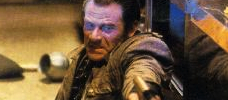
Trancers
1985 -

The Time Machine
1960 -

Groundhog Day
1993 -

Warlock
1989 -

The Navigator
1988 -
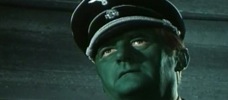
Tomorrow I’ll Wake Up and Scald Myself with Tea
1977 -

The Spirit of ‘76
1990 -
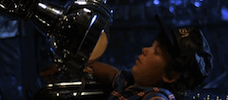
Flight of the Navigator
1986 -

La jetée
1962 -

Twelve Monkeys
1995 -

Beastmaster 2: Through the Portal of Time
1991 -
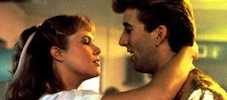
Peggy Sue Got Married
1986 -
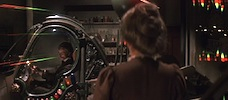
Time After Time
1979 -

Somewhere in Time
1980 -
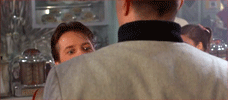
Back to the Future
1985 -

Back to the Future Part II
1989 -

Back to the Future Part III
1990 -

Idaho Transfer
1973 -
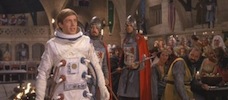
Unidentified Flying Oddball
1979 -

Slaughterhouse-Five
1972 -

The Lake House
2006 -
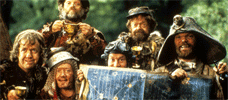
Time Bandits
1981 -

Doctor Who
1963–present -

Doctor Who
1963–present
We don’t do comments anymore, but you may contact us here or find us on Twitter or Facebook.



